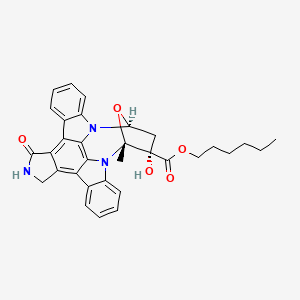m6A-centered Drug Response Information
General Information of the Drug (ID: M6APDG01985)
| Name |
KT-5720
|
||||
|---|---|---|---|---|---|
| Synonyms |
KT 5720; KT5720; 108068-98-0; GTPL337; ZINC3873013; KT 5720, > hexyl (15R,16R,18S)-16-hydroxy-15-methyl-3-oxo-28-oxa-4,14,19-triazaoctacyclo[12.11.2.1^{15,18}.0^{2,6}.0^{7,27}.0^{8,13}.0^{19,26}.0^{20,25}]octacosa-1(26),2(6),7(27),8,10,12,20,22,24-nonaene-16-carboxylate; (9S,10S,12R)-2,3,9,10,11,12-Hexahydro-10-hydroxy-9-methyl-1-oxo-9,12-epoxy-1H-diindolo[1,2,3-fg:3 inverted exclamation marka,2 inverted exclamation marka,1 inverted exclamation marka-kl]pyrrolo[3,4-i][1,6]benzodiazocine-10-c
Click to Show/Hide
|
||||
| Status |
Investigative
|
||||
| Structure |
 |
||||
| Formula |
C32H31N3O5
|
||||
| InChI |
1S/C32H31N3O5/c1-3-4-5-10-15-39-30(37)32(38)16-23-34-21-13-8-6-11-18(21)25-26-20(17-33-29(26)36)24-19-12-7-9-14-22(19)35(28(24)27(25)34)31(32,2)40-23/h6-9,11-14,23,38H,3-5,10,15-17H2,1-2H3,(H,33,36)/t23-,31+,32+/m0/s1
|
||||
| InChIKey |
ZHEHVZXPFVXKEY-RUAOOFDTSA-N
|
||||
| PubChem CID | |||||
| TTD Drug ID | |||||
Target Gene(s) and Their Upstream m6A Regulator, Together with the Effect of Target Gene(s) in Drug Response
The target genes involved in drug-target interaction (such as drug-metabolizing enzymes, drug transporters and therapeutic targets) and drug-mediated cell death signaling (including modulating DNA damage and repair capacity, escaping from drug-induced apoptosis, autophagy, cellular metabolic reprogramming, oncogenic bypass signaling, cell microenvironment, cell stemness, etc.) could be regulated by m6A regulator(s) and affected their corresponding drug response. You can browse detailed information on drug-related target gene(s) mediated by m6A regulators.
Extracellular signal-regulated kinase 2 (ERK2)
Heterogeneous nuclear ribonucleoproteins A2/B1 (HNRNPA2B1)
| In total 1 mechanisms lead to this potential drug response | ||||
| Response Summary | Extracellular signal-regulated kinase 2 (ERK2) is a therapeutic target for KT-5720. The Heterogeneous nuclear ribonucleoproteins A2/B1 (HNRNPA2B1) has potential in affecting the response of KT-5720 through regulating the expression of Extracellular signal-regulated kinase 2 (ERK2). | [1], [2] | ||
Insulin-like growth factor 2 mRNA-binding protein 2 (IGF2BP2)
| In total 1 mechanisms lead to this potential drug response | ||||
| Response Summary | Extracellular signal-regulated kinase 2 (ERK2) is a therapeutic target for KT-5720. The Insulin-like growth factor 2 mRNA-binding protein 2 (IGF2BP2) has potential in affecting the response of KT-5720 through regulating the expression of Extracellular signal-regulated kinase 2 (ERK2). | [2], [3] | ||
YTH domain-containing family protein 3 (YTHDF3)
| In total 1 mechanisms lead to this potential drug response | ||||
| Response Summary | Extracellular signal-regulated kinase 2 (ERK2) is a therapeutic target for KT-5720. The YTH domain-containing family protein 3 (YTHDF3) has potential in affecting the response of KT-5720 through regulating the expression of Extracellular signal-regulated kinase 2 (ERK2). | [2], [3] | ||
Ribosomal protein S6 kinase beta-1 (S6K1)
Methyltransferase-like 3 (METTL3)
| In total 1 mechanisms lead to this potential drug response | ||||
| Response Summary | Ribosomal protein S6 kinase beta-1 (S6K1) is a therapeutic target for KT-5720. The Methyltransferase-like 3 (METTL3) has potential in affecting the response of KT-5720 through regulating the expression of Ribosomal protein S6 kinase beta-1 (S6K1). | [4], [5] | ||
Stress-activated protein kinase 2a (p38 alpha)
Insulin-like growth factor 2 mRNA-binding protein 2 (IGF2BP2)
| In total 1 mechanisms lead to this potential drug response | ||||
| Response Summary | Stress-activated protein kinase 2a (p38 alpha) is a therapeutic target for KT-5720. The Insulin-like growth factor 2 mRNA-binding protein 2 (IGF2BP2) has potential in affecting the response of KT-5720 through regulating the expression of Stress-activated protein kinase 2a (p38 alpha). | [3], [6] | ||
Methyltransferase-like 3 (METTL3)
| In total 1 mechanisms lead to this potential drug response | ||||
| Response Summary | Stress-activated protein kinase 2a (p38 alpha) is a therapeutic target for KT-5720. The Methyltransferase-like 3 (METTL3) has potential in affecting the response of KT-5720 through regulating the expression of Stress-activated protein kinase 2a (p38 alpha). | [6], [7] | ||
YTH domain-containing family protein 3 (YTHDF3)
| In total 1 mechanisms lead to this potential drug response | ||||
| Response Summary | Stress-activated protein kinase 2a (p38 alpha) is a therapeutic target for KT-5720. The YTH domain-containing family protein 3 (YTHDF3) has potential in affecting the response of KT-5720 through regulating the expression of Stress-activated protein kinase 2a (p38 alpha). | [3], [6] | ||
Stress-activated protein kinase JNK1 (JNK1)
Methyltransferase-like 3 (METTL3)
| In total 1 mechanisms lead to this potential drug response | ||||
| Response Summary | Stress-activated protein kinase JNK1 (JNK1) is a therapeutic target for KT-5720. The Methyltransferase-like 3 (METTL3) has potential in affecting the response of KT-5720 through regulating the expression of Stress-activated protein kinase JNK1 (JNK1). | [8], [9] | ||
RNA demethylase ALKBH5 (ALKBH5)
| In total 1 mechanisms lead to this potential drug response | ||||
| Response Summary | Stress-activated protein kinase JNK1 (JNK1) is a therapeutic target for KT-5720. The RNA demethylase ALKBH5 (ALKBH5) has potential in affecting the response of KT-5720 through regulating the expression of Stress-activated protein kinase JNK1 (JNK1). | [9], [10] | ||
References